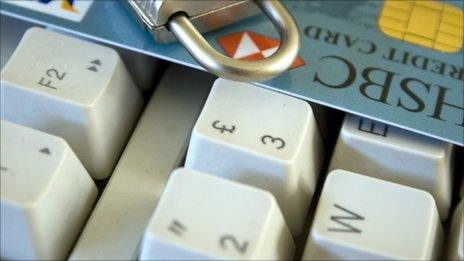Scottish council fraud case throws scams into focus
- Published

Many scams are carried out over the internet
A Scottish council has been conned out of more than £100,000 by a fraud gang which posed as one of its suppliers.
The scam, involving South Lanarkshire Council, has thrown into sharp focus the threat posed by fraud activity across Scotland and the rest of the UK.
According to the government-funded Consumer Direct, some three million people in the UK fall victim every year, losing an average of £850 each.
Fake lotteries and prize draws, bogus psychic predictions, get-rich-quick investments and "miracle" health cures are among tricks that scammers try.
In one case in January of this year, an elderly woman from Aberdeen was cheated out of £24,000, external in a Euromillions scam.
But businesses, whether public or private, are no more immune to being conned than individuals, according to the Serious Organised Crime Agency (SOCA).
SOCA fraud expert Colin Woodcock said he could not discuss specific cases.
But he did warn businesses and public bodies to keep a watchful eye out for scams.
'Exercise caution'
He said: "Businesses are as vulnerable as anyone else.
"Common scams are a false bill, or hijacking an account. Smaller companies, for example, might pass a bill on to their accountant and tell them to pay it without checking it too much.
"They should exercise caution and ask themselves if they remember this company or person, and give them a ring and check."
Dr Ian Ferguson, a digital forensics expert at the University of Abertay, said crime had well and truly moved into the computer age.
He commented: "Traditional crime has migrated and now uses the internet as its vehicle.
"People are still in awe of modern technology and they fail to look at the details around the edges - the technology gets in the way of their common sense."
A clearer picture is beginning to emerge of the scale and nature of scams in the UK, following the creation earlier this year of Action Fraud, a national fraud reporting centre run by the National Fraud Authority.
Mr Woodcock said inheritance fraud (a scam which cons people into believing they have been left a lot of money in a will) and romance scams, were of particular concern at the moment.
"People should remember that if something is too good to be true, then take it from me - it is," he added.
Here is a look at some of the most common scams as outlined by Consumer Direct:
Phishing
You get an email or see a pop-up message on a website claiming to be from a bank or online payment service.
The message may ask you to "update", "validate", or "confirm" your account information. It will probably direct you to a website that looks just like the real thing.
It is designed to trick you into revealing your personal information and confidential passwords so the scammers can steal your identity and run up bills or commit financial crimes in your name.
Advance fee fraud
This kind of scam is sometimes known as the '419 scam', so-named after the section of the Nigerian penal code that outlaws such activities.
A letter or email arrives offering you a huge payment in return for your help in getting money out of a foreign country.
The writer will tell you they need to transfer money to a bank in your country because of some major event such as the overthrow of a government. You're promised some of that money for helping with the transfer.
You will be asked for your bank details so that the money can be deposited in your account. The fraudsters then use the information you give them to raid your bank account. Alternatively, you will be told to send an upfront fee. You will get nothing in return.
Cheque overpayment
Someone responds to your advert or eBay posting with an offer to pay by cheque. At the last minute, the buyer comes up with a reason for writing the cheque for more than the purchase price, and asks you to transfer back the difference after you deposit it.
Usually, the cheque is counterfeit, but it'll be good enough to fool bank staff at first. You transfer back some money to the buyer before the cheque has cleared, but soon your bank contacts you to say the cheque has bounced. There's no way for you to recover the money you've lost.
Fake lotteries
You receive a letter, phone call, text message or email telling you that you've won a huge sum of money in a lottery - without even having entered. You just have to telephone an agent to make arrangements to receive your winnings.
Once you contact the agent, you are told that, to claim your winnings, you just need to send money to cover "processing" or "administration" costs or taxes. You may also be asked for personal or financial information for "identification". Those behind this scam will take your money and you will get nothing in return.
Online dating
You sign up to an online dating agency and meet someone who is also looking for love.
You write to each other for a few months until the person, who happens to live overseas, decides that they want to come to the UK.
But they need help with money for the flight. You pay up to help your new friend - but he or she disappears, along with your cash.
- Published24 September 2010
- Published7 September 2010
- Published9 August 2010